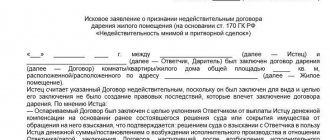- Concept of donation
- Challenging a gift agreement
- How to challenge a gift agreement
- Grounds for challenging a gift agreement
- Is it possible to cancel a deed of gift?
- Who can challenge a gift agreement?
- Can relatives challenge a deed of gift during the life of the donor?
- Time limit for challenging a gift agreement
A gift agreement, like any other transaction, can be challenged in court if there are grounds provided for by the current civil legislation of the Russian Federation.
Donations are often contested by the donors themselves, who for one reason or another have changed their minds about donating the property and want to return it. Also, quite often, after the death of the donor, his relatives want to challenge the gift agreement, believing that the transaction could have been made contrary to the will of the donor.
Many people are concerned about who can challenge the gift agreement, whether it is possible to challenge the gift agreement during the life of the donor, whether it is possible to challenge the deed of gift after the death of the donor, whether the donor’s heirs can challenge the gift agreement, etc.
Concept of donation
What is a gift agreement?
It is legally defined that a gift agreement is a gratuitous transaction in which one party, the donor, gratuitously transfers or undertakes to transfer an item of ownership or property right to the other party, the donee.
As we can see, one of the significant features of the gift agreement is its gratuitous nature , that is, the complete absence of consideration. The presence of any given provision in the form of a thing or obligation indicates the absence of a donation.
What can be the subject of a donation:
- The property of the donor, which means any thing, including movable and immovable property, securities, money, that is, any property that has value.
- A property right (claim) against the donor himself or a third party for any obligation (with the exception of rights inextricably linked with the personality of the creditor, the assignment of which to another person is not permitted, for example, a claim for the payment of alimony)
- Release of the donee from a property obligation to the donor or a third party (for example, forgiveness of a debt).
By concluding a gift transaction, the donor shows the will to alienate property free of charge, and the donee – the will to accept the gift.
The moment of concluding a gift transaction is the moment of transfer of the gift to the donee (Articles 224, 433, 574 of the Civil Code of the Russian Federation).
Donation agreements concluded after 03/01/2013 do not require state registration, but the transfer of ownership of the donated property to the donee is subject to state registration.
Registration of the transfer of ownership of a gift to the donee is not possible without a corresponding application from the donor. Attention: Donation after the death of the donor is unacceptable .
One of the important features of a gift agreement is that it can only be completed during the life of the donor. A promise to make a gift after the death of the donor is void.
Read more about donation here.
Get a free consultation with a gift lawyer. Tel.+7 (812) 989-47-47 Telephone consultation
What does judicial practice say regarding challenging deeds of gift?
Judicial practice in such cases is ambiguous. This is due to the variety of grounds provided for invalidating a gift agreement. And also in each case under consideration it depends on the evidence presented by the parties.
There are a sufficient number of examples when the court declared the deed of gift invalid after the death of the donor. But in such cases, the parties presented compelling reasons and indisputable evidence of the validity of their demands to invalidate the transaction.
Therefore, you need to prepare for the trial carefully, and, if possible, involve an experienced lawyer or attorney in solving the problem.
Challenging a gift agreement
The concept of “challenging a transaction” includes a number of methods of protecting civil rights aimed at terminating or canceling a transaction.
The law clearly defines the grounds for challenging a transaction. If there is at least one of the grounds mentioned in the law, the deed of gift can be challenged.
1) A gift agreement may be challenged on the grounds of its nullity or invalidity by:
- Recognizing a transaction as invalid and applying the consequences of its invalidity
- Application of the consequences of invalidity of a void transaction
2) The gift agreement can be canceled by the donor . Please note that in relation to a gift agreement, we should not talk about termination of the agreement, but rather about the cancellation of the gift in accordance with Art. 578 of the Civil Code of the Russian Federation. Below we will talk about canceling a gift in more detail.
3) The donee may refuse the gift before the donated property is transferred to him.
The possibility of a donee refusing to accept a gift is provided for in Article 573 of the Civil Code of the Russian Federation. According to the provisions of this norm, the donee may refuse the gift before the gift is transferred to him, but at the same time his refusal of the gift must be made in the same form as the donation itself, i.e. If the gift transaction is concluded in writing and certified by a notary, then the refusal of the gift must be made in writing and certified by a notary.
If the donee refuses to accept the gift, the gift agreement is considered terminated.
4) In a number of cases, the donor also has the right by law to refuse to execute the gift agreement (Article 577 of the Civil Code of the Russian Federation).
It is necessary to distinguish between the institutions of invalidity and termination of a transaction.
These are fundamentally different ways of protecting subjective civil rights, since they entail different legal consequences.
An invalid transaction does not entail legal consequences and is invalid from the moment of its completion, that is, it loses force from the moment of its conclusion (retrospectively), and the consequence of applying the invalidity of the transaction is restitution, i.e. the obligation of the parties to return everything received under the transaction.
For declaring a contract invalid, such grounds are provided as non-compliance with laws and other legal acts, the fundamentals of morality and legal order, the conclusion of a transaction with a defect of will, expression of will, etc., while we are talking about violations that could lead to the invalidity of the contract, which took place precisely at the moment conclusion of the contract.
Only a valid transaction can be terminated or canceled, that is, completed in accordance with the requirements of the law, without defects of will, capacity or legal capacity of the donor.
We will help you challenge the gift agreement. Only qualified experienced lawyers work. Tel.+7 Telephone consultation
Deadlines
Article 181 of the Civil Code of the Russian Federation establishes a period of three years for citizens during which they can try to appeal and cancel the deed of gift. This time is considered either from the date the document actually comes into force, or from the moment when the interested person learned about it.
The maximum possible statute of limitations for cases on this topic is ten years . And from the moment when a person learned that for some reason the deed of gift can be challenged, no more than one year should pass before he actually files a claim.
IMPORTANT! The deadline for appealing the transaction has been increased for the donor. This is done because the giftee can wait three years and begin to harm the health of his benefactor or his gift. So the one who donated the apartment has five years to cancel the contract.
How to challenge a gift agreement
There are not always compelling legal grounds for challenging a gift transaction; often the desire to challenge the transaction is dictated by a banal refusal to accept the fact of alienation of property, and people try to return it in any way.
Unfortunately, many believe that an incorrect assessment of the situation, rash actions at the time of making a gift transaction and other similar reasons can become the basis for the return of what was transferred under the transaction. Such opinions are wrong. For example, the fact that the donor simply changed his mind about donating his property, or had a quarrel with the donor and broke off relations with him, will in no way affect the result of the transaction; it is impossible to cancel or challenge the donation on such grounds.
It is necessary to have a clear understanding that challenging any transaction is not an easy task. The civil legislation of the Russian Federation defines a clear and comprehensive list of grounds for challenging a transaction. Judicial practice in challenging transactions is not uniform, which makes this category of disputes difficult even for trained lawyers.
The legal complexity of cases in this category is obvious. As a rule, these are assessment cases with individual characteristics that can affect the outcome of the case.
How to challenge a deed of gift and who can challenge a deed of gift can be found out by calling Tel.+7 Telephone consultation
Challenging a gift agreement requires not only excellent knowledge of the current legislation in the field of challenging transactions and law enforcement practice, but also sufficient experience in handling cases of this category.
Therefore, before initiating a challenge to a gift agreement, it is necessary to thoroughly understand the legal intricacies of this issue and understand in what cases it is possible to challenge a gift agreement, whether it is possible to cancel a deed of gift in a particular case, and whether there are legal grounds for challenging a deed of gift.
To do this, it is worth taking advantage of a detailed in-person consultation with a competent lawyer who practices in the field of challenging transactions.
Lawyers specializing in civil law provide free consultations on the possibility of challenging a gift agreement.
For a complete and high-quality consultation, a lawyer needs to deeply study and analyze the available documents, which will allow him to correctly assess the situation.
Only a qualified lawyer with practical experience in handling such cases can help with choosing the appropriate method of protecting a violated civil law and assessing the real prospects of challenging a gift transaction in court.
What to do after the evidence is collected?
First of all, do not skimp on a quality lawyer. A good lawyer will always find a way to help and achieve justice. Having hired a smart lawyer, provide everything you have collected to him. After he evaluates the chances, feel free to take the entire package of documents to the court, where you are required to accept the claim.
Rules for drawing up a claim to challenge
You can file a claim only if you have identification documents with you. Don’t forget to include the original (if any) and a copy (required) of the deed of gift in the folder. This is something without which your application will simply not be accepted.
If the first stage is passed, we begin to file a claim. We describe everything in an accessible way, without any “water”. You need to state the essence of the problem as clearly as possible, describe the reason why you came to the conclusion that you have the right to challenge the document.
We attach all certificates, records, photographs, and witness statements to the application. Remember! That the deadlines for filing an application are tight, but you still have every right to present new evidence even when the main documents are already in court. The more supporting documents you collect, the higher your chances of success.
Grounds for challenging a gift agreement
Let us consider the most common grounds for challenging a gift agreement in law enforcement practice:
- The gift agreement was concluded for a purpose that is deliberately contrary to the fundamentals of law and order or morality.
- The form and procedure for concluding a gift agreement provided for by civil law have not been observed, or the transfer of ownership under the gift agreement has not passed state registration, that is, the agreement does not comply with the requirements of the law and other legal acts
- At the time of the donation transaction, the donor was not able to understand the meaning of his actions and to lead. This basis entails the invalidity of the donation transaction. Such a transaction, unlike a void transaction made by an incompetent person, is voidable. An analysis of law enforcement practice shows that this basis is very common in cases of this category. The evidence base is built on the results of a psychiatric examination conducted in relation to the donor during the period of the deed of gift, as well as on the testimony of the parties, witnesses, assessment of the documents presented by the parties, etc.
- transaction was made for show - the so-called imaginary transaction , when the parties did not intend to create the legal consequences that the donation entails, that is, in fact, there was no intention to transfer the thing. For example, a transaction was made to avoid debts, to avoid foreclosure on property, etc. An imaginary transaction is void, but of course its imaginary nature is subject to proof.
- A donation transaction was made with the aim of covering up another transaction (sale, rent, etc.) - a sham transaction . The sham nature of the transaction is indicated by the intention of the parties to cover up another transaction that actually took place. For example, if the parties draw up and sign a gift agreement in order to cover the actual sale of property, then the gift transaction will be considered void. An example is a gift transaction concluded in order to circumvent the right of a co-owner to preemptively purchase a share in the right of common shared ownership. In this case, the circumstances of compensation for the alienation of property must be proven.
- The transaction was signed by an unauthorized person , signed not by the donor himself, but by another person, made under a forged power of attorney . Often in law enforcement practice there are cases challenging transactions made under a power of attorney, the powers in which are of a general nature, without indicating the subject of the gift and the donee, which is a direct violation of the requirements of the law contained in Part 5 of Art. 576 of the Civil Code of the Russian Federation and entails the nullity of such a power of attorney.
Falsification of signatures on documents can be proven by handwriting examination.
- At the time of the transaction, the donor was deprived of legal capacity by the court due to a mental disorder. This circumstance entails the nullity of the donation transaction. It will not be difficult to prove the nullity of a transaction made by an incompetent person, since the proof is a court decision that has entered into legal force declaring the donor incompetent, and a psychiatric examination of the donor in this case is not required.
- The gift agreement was concluded by the donor under the influence of a significant misconception (regarding the subject, nature of the transaction, etc.), or under the influence of violence or threat, deception, or due to a combination of difficult circumstances (a enslaving transaction).
It should be noted that these grounds for challenging a transaction are the most difficult to prove in court, and without the help of an experienced lawyer it will be difficult to achieve a positive result.
- The gift agreement contains a condition that the property will be transferred to the donee after the death of the donor. This condition also entails the nullity of the gift agreement. A claim for application of the consequences of the invalidity of such a transaction may be brought by the heirs of the donor, since the property “donated” in this way is subject to inclusion in the inheritance estate
- The donation of property was made under existing restrictions or prohibitions on the disposal of property (for example, a pledge of property held by a creditor)
- The notarized consent of the donor's spouse for the donation of property acquired by the donor during the marriage and registered (registered) in his name
Legal advice from lawyers on civil law. Tel.+7 (812) 989-47-47 Telephone consultation
Consequences of declaring a gift invalid
A deed of gift that has been declared invalid by a court should not be executed. But if the agreement was already in force and the parties transferred things under it, then they must return them back.
If we were talking about a sham transaction, then the court has the right to apply to the relations of the parties the rules governing the “correct” contract.
The parties will learn what consequences will be applied from the court decision. The operative part states not only the judge’s verdict, but also the “answers” to all stated demands.
Disputes regarding the invalidation of a deed of gift are a long and complex category of cases. The outcome of its consideration will largely depend on how competently the claim is drawn up and what evidence is presented. Therefore, the services of an experienced and qualified lawyer will help determine the strategy in the process. The principal will receive detailed advice and assistance in preparing for the trial.
Is it possible to cancel a deed of gift?
The possibility of canceling a donation is provided for by law (Article 578 of the Civil Code of the Russian Federation). This provision specifies the grounds upon which the donor has the right to cancel the donation and return his property.
1) The donor has the right to cancel the donation in the following cases:
- The donee has made an attempt on the life or health of the donor or his close relatives
- The donee caused bodily harm to the donor
2) In case of deliberate murder of the donor by the donee , the heirs of the donor can cancel the donation.
3) Cancellation of a donation is entailed by the recipient’s careless handling of the thing donated to him, which has great intangible value for the donor. The law states that the donor can legally demand the cancellation of the gift if the recipient’s handling of the thing donated to him, which has great non-property significance for the donor, entails the risk of imminent irretrievable loss of this thing.
4) The donor survived the donee. The gift agreement may provide for the possibility of cancellation of the donation by the donor if he outlives the donee (Part 4 of Article 578 of the Civil Code of the Russian Federation). The inclusion of such a condition in the contract is the will of the donor, but its mere presence in the contract does not entail the automatic cancellation of the gift in the event of the death of the donee before the donor.
To cancel the donation, the donor will have to file a lawsuit against the heirs of the donee, justifying his claim with the relevant term of the contract. Of course, the opportunity to cancel the deed of gift in accordance with Part 4 of Art. 578 of the Civil Code of the Russian Federation should be used when concluding a gift agreement; the inclusion of such a clause in the gift agreement will not be superfluous.
The parties may terminate the donation agreement (cancel the donation) by written agreement without judicial intervention , however, if the donee evades the conclusion of such an agreement if there are appropriate grounds, the donation can only be canceled by judicial procedure.
If the donation is cancelled, the donee is obliged to return the donated property to the donor, provided that it has been preserved by that time.
Remember
- A deed of gift can be real, consensual or in the form of a donation.
- After the death of the donor, his successors, the donee and third parties can challenge the deed of gift.
- Relatives can challenge the deed of gift on almost any basis specified in the law.
- The primary successors most often initiate the recognition of the transaction as invalid, since they will be able to claim the donated apartment if the contract is cancelled.
- In order to challenge the deed of gift, the interested party must go to court.
- The court decision, which satisfied the applicant's requirements, is transferred to the notary for inclusion of the property in the inheritance mass.
Will you try to prove that the donor was incapacitated at the time the gift deed was entered into? Will you try to collect the necessary documents yourself and prepare a claim in court, or contact an experienced lawyer?
Can relatives challenge a deed of gift during the life of the donor?
If the donor is not deprived of legal capacity or limited in it, the transaction was made in accordance with the requirements of the law and other legal acts, the donor was of sound mind and sober memory when making the transaction, the relatives of the donor do not have the right to challenge the agreement during his lifetime.
The owner disposes of his property at his own discretion, that is, he has the right to alienate it in any way, to any person and at any time.
The donor is not required to ask anyone's consent to dispose of his property, with certain exceptions. For example, when we are talking about property acquired during marriage, the donation of such property requires the notarized consent of the donor’s spouse, or when property is alienated by donation by a person limited in legal capacity due to alcohol or drug abuse, the mandatory consent of his trustee is required.
Is a deed of gift for a house or apartment contested after the death of the donor?
The basis for challenging a deed of gift for an apartment or house after the death of the donor is most often the lack of consent of the spouse or all owners to complete the transaction.
The fact is that when an apartment/house was purchased during marriage, they are jointly acquired property - Art. 35 IC RF. Accordingly, if one of the spouses wishes to give it as a gift, he must obtain the notarized consent of the second spouse to complete the transaction. Check the contract: there is no such condition - you can challenge it.
Important! The requirement does not apply to spouses between whom a marriage contract has been concluded. According to the terms of such a document, one of the spouses can dispose of property without the consent of the other.
The transaction can be challenged if the apartment/house had several owners:
- But the property was transferred under a gift agreement on behalf of only one of them - without obtaining the consent of all owners.
- Or the share of the person wishing to transfer it as a gift has not been allocated, and the transaction has not been certified by a notary.
A deed of gift for a house is drawn up together with the land plot on which it is located - Art. 35 of the Land Code of the Russian Federation. Otherwise, the transaction can be challenged.
Who can challenge a will
Most often, a will is contested by first-degree heirs.
(children, spouse, parents).
According to the law, to an obligatory share in the inheritance,
regardless of who is indicated in the last will of the testator. These include:
- parents and spouse (disabled);
- children of the testator (disabled/minors);
- disabled dependents living with the testator whom he supported.
Representatives of the above categories have the right to at least half of the share of the inheritance due to them by law.
What is a will
A will is a document drawn up in the form prescribed by law. With its help, you can dispose of your property in the event of death. Typically, a will is drawn up if you do not want the property to be distributed among the heirs according to the order established by default by law.
A will is made in writing
, and then
certified by a notary
or other person authorized by law.
The procedure must be performed personally and be fully capable
. A will has no statute of limitations. You don’t have to tell your heirs about it.
Honored Lawyer of Russia, Doctor of Legal Sciences Ivan Solovyov advises how to draw up a will:
“In order to be calm regarding your expression of will about the fate of your movable and immovable property, you must strictly follow the procedure and form for drawing up and certifying a will. And although there are no strict requirements for wording, and it can be drawn up in free form, first of all, care must be taken to ensure that all the wishes of the testator are indicated and described clearly and understandably - so that there are no ambiguous interpretations.”
Grounds for filing a claim
In this regard, one must be guided by the provisions of Article 578 of the Civil Code of the Russian Federation. The primary reason for filing a claim is the desire of the heirs to obtain housing at their disposal at any cost. You can challenge the transaction if the donation is contrary to your interests.
- Significant reasons include the execution of the document by a minor citizen.
- It is also possible to challenge a transaction if the form of the contract is violated, for example, if there are no signatures in the text. Arguments may include illegal actions committed by the recipient towards family members.
- A contract can be challenged when the donor signed the document while incapacitated. The reason for challenging the contract can be the conclusion of a contract under pressure, for example, harm to health, torture. In order for the arguments to be reliable, audio and video recordings must be provided.
- The donor may not have the housing transaction notarized. Such a process must be carried out in accordance with the law while the donor is alive. In the absence of such registration, the agreement is not recognized by the court.
- An agreement drawn up by one of the spouses who is divorced may raise suspicion. A transaction can be contested if it was drawn up by a woman for her new partner. This right belongs to the ex-spouse.
- Lawyers note that it will not be difficult to challenge an agreement that is concluded with the aim of not paying taxes.
- A gift transaction made in the name of an official is also considered invalid. This rule applies if the donation amount is over three thousand rubles.
- You can challenge a document when the donor was not the sole owner of the property; he drew it up, but did not notarize it.









